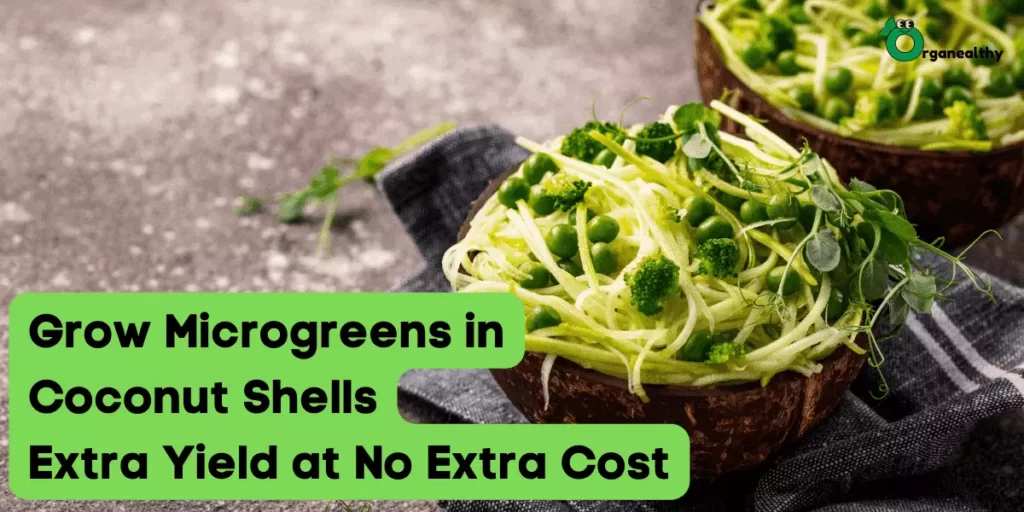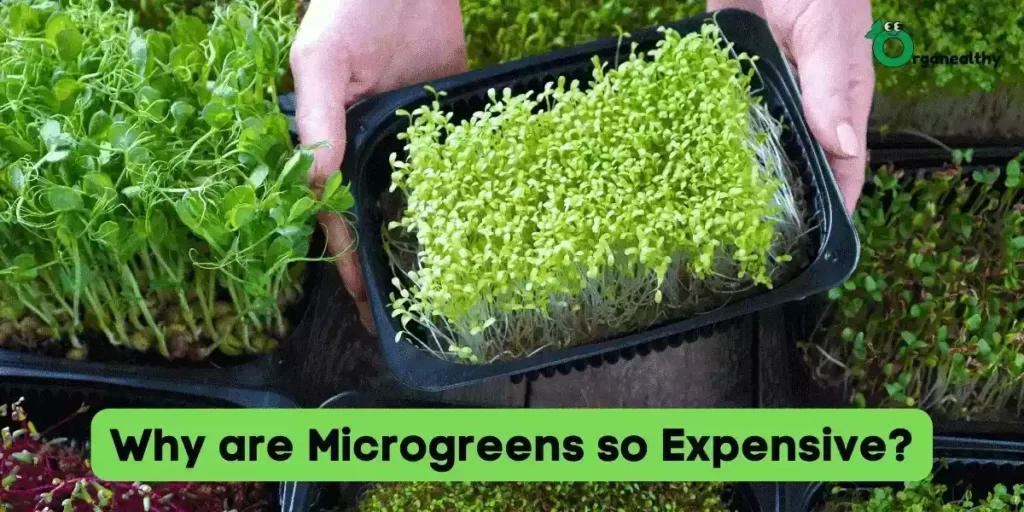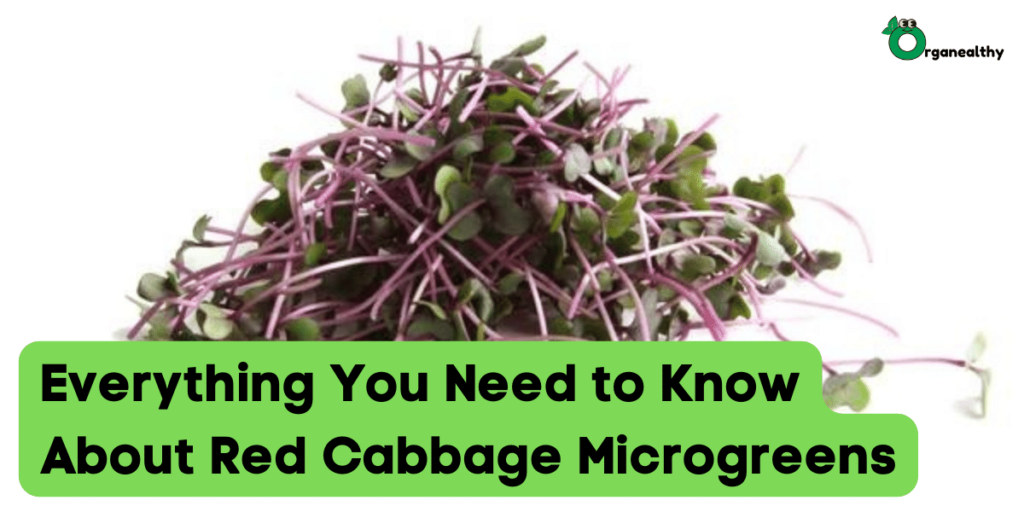Did you know that the global market for microgreens is forecast to reach USD 2 billion by 2028?
As people are increasingly starting to adopt a healthy lifestyle and organic eating, it is essential to match this demand.
Microgreens businesses are one of the most profitable businesses to do in 2024. In fact, along with leafy greens, microgreens tend to have the highest profit margins – 40%.
But before you get your hands dirty in the soil, you need to know the most profitable microgreens that can take your business to the next level.
Microgreens are easy and quick to cultivate, and the business has a low to moderate setup cost, depending on your scale of business.
To give you a sneak peek, broccoli microgreens are one of the most in-demand varieties and can fetch you a PROFIT of $13 to $20 per tray.
So, that’s one for you; what are the other 8?
Let’s find out.

Why is the Microgreens Business Profitable?
People are adopting healthy eating habits more than ever.
The International Food Information Council conducted its 17th Food and Healthy survey in 2022. Here are some of the insights from the study.
- 52% of Americans claimed to follow a healthy diet routine
- 30% of Americans focus on a nutritional diet to manage stress
- 31% of respondents eat more plant-based proteins
Similarly, there are various other insights that support the idea of healthy and organic eating.
This growing demand needs to be matched, and microgreens – due to their high nutritional properties – are an excellent way to supply this demand.

Source: Todd’s Seeds
Now that I have established that there is a demand for microgreens business. Let me tell you about the profitability of this business.
Before we jump into the most profitable microgreens, let me tell you why this business, as a whole, is worth your time.
This is all the equipment you need to start growing microgreens.
- Microgreens seeds
- Soil
- Growing trays (10″X20″)
- Spray bottle
- Scissors or a sharp knife to harvest microgreens
- T5 LED Grow Lights (read our complete guide on the best lights for microgreens)
You can even start with a beginner-friendly microgreens growing kit just to test things out.
Now, you can either start small, possibly for under $1000, or if you have a large space and want to go all in, you can spend a few thousand more.
9 Most Profitable Microgreens to Boost Your Business
Microgreens are in high demand among consumers for their nutritional properties, but they are also popular among growers for their easy-to-grow process.
Here’s the list of the 9 most profitable microgreens that are easy to grow and are in high demand. You can visit the True Leaf Market store to buy microgreens, seeds, or equipment needed to grow microgreens.
| Microgreens | Total Growth Period (Days) | Length at Harvest (Inches) | Sell at (per pound) |
|---|---|---|---|
| Broccoli | 7 to 14 | 2 to 3 | $25 to $40 |
| Arugula | 10 to 12 | 1 to 3 | $20 to $25 |
| Mustard | 5 to 14 | 1 to 3 | $15 to $20 |
| Cress | 8 to 12 | 2 to 3 | $10 to $20 |
| Cabbage | 5 to 14 | 2 to 3 | $20 to $25 |
| Radish | 8 to 10 | 2 to 3 | $25 to $40 |
| Sunflower | 12 to 14 | 2 to 3 | $35 to $40 |
| Pea Shoots | 10 to 12 | 2 to 3 | $20 to $30 |
| Salad Mix | 8 to 12 | 1 to 3 | $25 to $30 |
1. Broccoli Microgreens
Out of all the varieties of microgreens sold in the markets, 25% share is held by broccoli microgreens.
Broccoli microgreens are not only highly nutritious but also taste really good, thus the high demand.
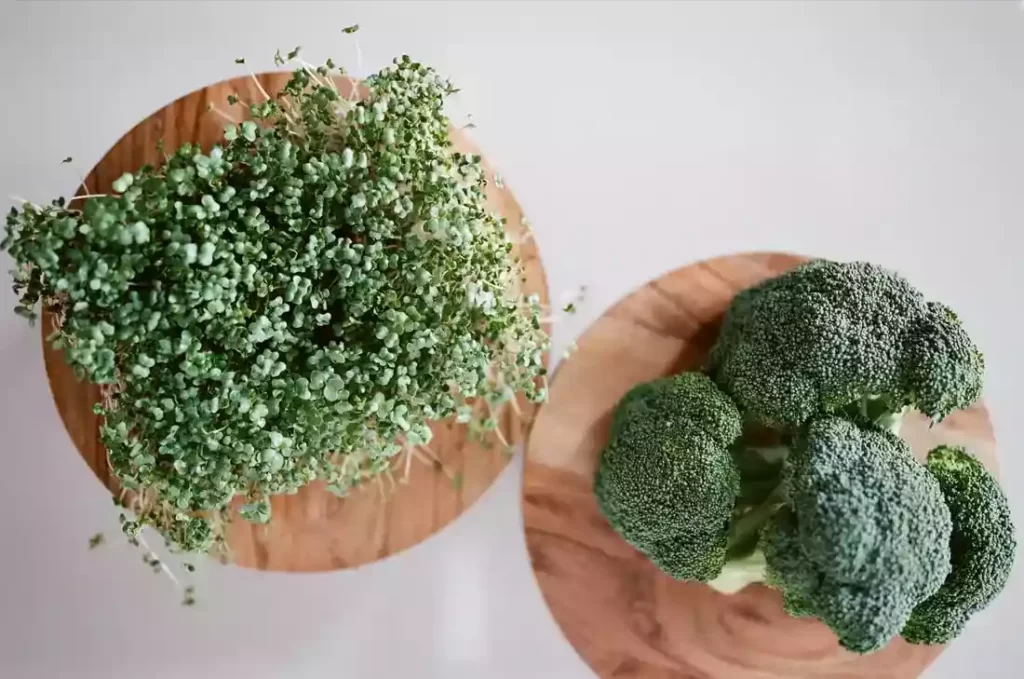
A study published by the National Center for Biotechnology Information suggests that broccoli microgreens can be grown in 158-236 times less water and 93%-95% less time than it does to grow an equally nutritional mature vegetable.
And this too without the need for a heavy commute from farm to table or the use of pesticides/fertilizers.
The ideal harvest time for broccoli microgreens is 7 to 14 days when they are 2 to 3 inches tall. Yes, broccoli microgreens are one of the fastest-growing microgreens, just like buckwheat microgreens.
Microgreens business, in general, has low capital investment, and thus, if you want to start yours with just one variety, then broccoli microgreens should be your first choice.
2. Arugula Microgreens
Arugula is one of the beginner-friendly varieties of microgreens that can be harvested within 10 to 12 days.
Arugula tastes the best when raw. Its unique bitter, nutty, and zesty flavor makes it a popular choice for salad toppings and garnishing salads.
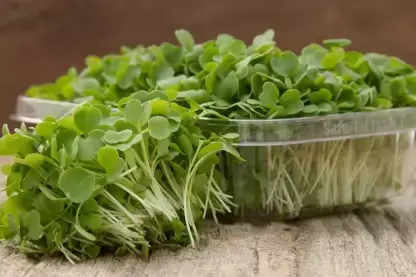
Like most microgreens varieties, arugula microgreens can be harvested when they are 1 to 3 inches tall.
On a fun note, Romans used to consume arugula as a medicine as well as an aphrodisiac.
Arugula microgreens are known to be one of the most nutritionally dense foods and are particularly high in cancer-fighting agents. It is filled with fiber and phytochemicals.
The delicious green is full of calcium, potassium, folate, and important vitamins (A, C, and K).
3. Mustard Microgreens
Mustard microgreens are one of those microgreens that are more popular for their taste than their nutritional properties.
Consumers love mustard microgreens for their sweet and hot taste, making them a popular choice to consume with dinner.

The entire production cycle for a batch of mustard microgreens is between 5 to 14 days. You can harvest them when they are 1 to 3 inches tall.
Mustard microgreens promote healthy hair growth and can counter diabetes and various other illnesses.
These properties make mustard microgreens one of the most profitable microgreens to grow.
4. Cabbage Microgreens
There are different varieties of cabbages, such as green cabbage, red cabbage, Napa cabbage (aka Chinese cabbage), and many more.

Red cabbage microgreens are more popular for their vibrant red-colored stems, while Chinese cabbage microgreens are popular for their sweet and tender taste.
Various varieties of microgreens are popular for their distinct properties and, thus, are sold at varying prices.
The entire process of growing cabbage microgreens can take from 5 to 14 days. Once you see the cotyledon leaves fully opened with rich colors, they are ready to be harvested.
According to a study published in the American Chemical Society, red cabbage microgreens are filled with polyphenols and glucosinolates, which can effectively lower bad cholesterol and keep your heart healthy.
These health benefits make cabbage microgreens one of the most in-demand varieties of microgreens.
🔔 Read our complete guide on red cabbage microgreens if you want to know more!
5. Radish Microgreens
Did you think radishes were only popular as vegetables? WRONG!
Radishes microgreens are one of the most popular microgreens and one of the tastiest as well. Their surprisingly crunchy texture and fresh, spicy flavor make them one of the favorites for healthy eaters.
Due to their high demand, radish microgreens are one of the most profitable microgreens to sell in the market.

In 2012, the Journal of Agriculture and Food Chemistry published a detailed study of commercial microgreens.
The study analyzed various varieties of radishes, such as green daikon radish, china rose radish, and opal radish, and determined that they are a high source of vitamins K, C, E, and beta-carotene.
Radish microgreens help with weight loss and skin problems and improve the cardiovascular system.
Not only that, radish microgreens are one of the quickest-growing varieties of microgreens; they can be harvested within 8 to 10 days.
🔔 Read our complete guide on radish microgreens if you want to know more!
6. Cress Microgreens
Cress microgreens are filled with important vitamins like K and C. Similar to Arugula, Cress microgreens are popular for their peppery, zesty flavor.
Due to their flavor and nutritional properties, Cress microgreens seem to be a popular choice for salads and smoothies.

Cress microgreens are known to get a mellowed taste when they mature; hence, it is advised that you grow them in small quantities. They can be harvested within 8 to 12 days.
7. Sunflower Microgreens
Sunflower microgreens are known for their crunchy, nutty flavor. They are filled with fiber and various other vitamins and minerals.
In today’s busy world, most people miss out on their daily nutritional needs. 1 cup of sunflower microgreens can give consumers 8% of their daily iron needs and 2% of their daily calcium needs.

Sunflower microgreens are one of the healthiest microgreens to eat and one of the easiest to grow. Thus, if you are a beginner, you can start with this variety. They become harvestable in 12 to 14 days.
8. Pea Shoots
If you are looking for a variety of microgreens that produce a high yield, then pea shoots are one of the best microgreens to grow.

Pea shoots microgreens are filled with nutrients and are one of the beginner-friendly varieties. Pea shoots are quite popular for being one of the most profitable microgreens due to their high yield per batch.
Pea shoots microgreens have a crispy texture and boast a mild flavor that blends well with any dish. Chefs love them as they look exotic when used in garnishing, and kids love them for their snow peas-like flavor.
They also have a good shelf life and can be stored in a refrigerator for up to a week.
Pea shoots microgreens are among those varieties of microgreens that are popular as “regrowers”. You can get multiple harvests from the same soil and the same seeds.
9. Salad Mix
Some microgreens are known as “salad microgreens” and have a less intense flavor when mixed, which makes them easy to consume for those who prefer mild food.

They are fully packed with nutrition and loved by chefs for their amazing texture and vibrant colors.
I’d recommend a mix of lettuce, cabbage, mustard, arugula, and kohlrabi, or else you can make your own customized mix of your favorite microgreens.
5 Tips to Run a Profitable Microgreens Business?
1. Grow Popular Varieties of MIcrogreens
The varieties that we discussed above are not only the most profitable microgreens to grow but also some of the most popularly demanded.
If you want to run a profitable microgreens business, you need to know the market demand, and most importantly, you need to supply to that demand.
Hence, it is advised that even if you are a beginner, start with the popular varieties of microgreens like broccoli, sunflower, radish, arugula, etc.
These varieties are easy to grow and easy to sell.
2. Store Microgreens Properly
No matter how much you take care of your greens when you are growing them, it is essential that you take EXTRA care when you are storing them.
Things you need to keep in mind before packaging your microgreens:
- Your microgreens must be fresh and healthy, not wilted
- Microgreens shouldn’t be harmed or bruised at the time of harvesting
- Wet greens will rot quicker; make sure you don’t store them wet
You can store microgreens in resealable bags, plastic clamshell containers, and even biodegradable containers.
However, these containers should be stored in a refrigerator. This will keep the microgreens crisp and usable for about a week.
Follow our complete guide on how to store microgreens properly and extend their shelf life.
3. Establish Multiple Sales Channel
Some of the most burning questions that any microgreens seller would have are: who buys microgreens? Where to sell these microgreens?
So, here’s the answer.
Many high-end restaurants are willing to pay premium prices for microgreens due to their niche demand.
You can even sell to your local residents. You will have to keep your prices low when you sell to the locals.
You can even run a subscription-based business, like every week, you will deliver 1 pound of microgreens to a particular restaurant or a customer.
Nowadays, online grocery shopping is slowly growing, so you can even set up a website or an online store to sell these microgreens online.
If you wish to take the more traditional methods, then you can either sell the greens in the farmers’ market or sign a deal with your local grocery stores.
But keep in mind, do not depend on one sales channel. Keep on experimenting with the new ones.
4. Try Social Media Marketing
Do I even need to explain this?
Social media is not just for gathering huge exposure for your business but also for generating sales.
Using the right social media platform, you can skyrocket your business sales. For a microgreens business, YouTube and Instagram are the best platforms to try.
You can create YouTube videos documenting your growing process or create Instagram reels to share tips about growing microgreens and various other aspects of the business.
You can even start or join a Facebook community and start interacting with other sellers or customers.
5. Keep on Experimenting
If you are finding it difficult to sell in your locality, I suggest you try experimenting with varieties that other businesses are not growing.
Introducing a new variety of microgreens to your locality can be a great way to carve out your niche.
So, Are You Ready to Grow the Most Profitable Microgreens?
Even if I have shared the list of the most profitable microgreens with you, it depends on how you do your business and how much effort you put into it.
It does not matter if you are growing microgreens indoors or on a large farm. What matters is how determined you are to make your business successful.
Do read my other articles where I share more aspects about microgreens to gain comprehensive knowledge of these highly nutritious superfoods.
So, gear up and start your microgreens business today.



